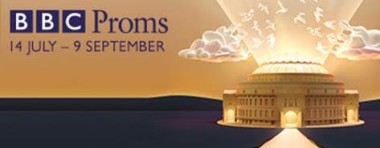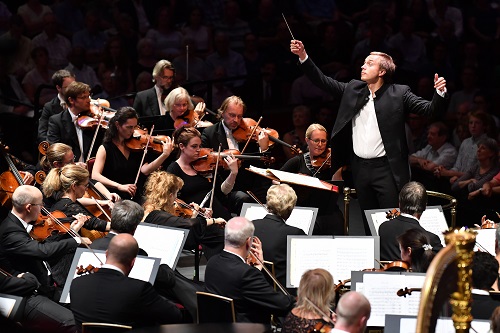
 United Kingdom 2017 BBC Proms 60 – Stravinsky, Rachmaninov, Shostakovich: Leif Ove Andsnes (piano), Oslo Philharmonic / Vasily Petrenko (conductor). Royal Albert Hall, London, 29.8.2017. (GD)
United Kingdom 2017 BBC Proms 60 – Stravinsky, Rachmaninov, Shostakovich: Leif Ove Andsnes (piano), Oslo Philharmonic / Vasily Petrenko (conductor). Royal Albert Hall, London, 29.8.2017. (GD)

Stravinsky – Firebird Suite (revised version, 1919)
Rachmaninov – Piano Concerto No.4 in G Minor (revised version, 1941)
Shostakovich – Symphony No.12 in D minor, ‘The Year 1917’
Although there have been many attempts to ‘westernise’ Shostakovich, he remained throughout his life, dedicated to Lenin and the great Russian Revolution of 1917; and this despite the corruption and brutality of the Stalin era. But apart from being a programmatic symphony about Lenin and the 1917 Revolution, the 12th Symphony a very well-structured work, more economic than the 11th Symphony which recalls the Tsarist brutality against the suffering Russian people in 1905. Petrenko plunged us into the first movement’s powerful unison theme on cellos, double basses and bassoons with great conviction. And what an impressive sound the Oslo Philharmonic made here – and throughout the symphony – with their grainy, sharp woodwind, elemental brass and a huge diversity of tone in the strings, with antiphonal violins. Indeed, some of the frenzied, dramatic sections, reminded me of the Leningrad Philharmonic, who gave the first performance, under the great Mravinsky, in October 1961. Although at times, in the more dramatic music – like in the short but forceful scherzo – I missed some of the elemental thrust and power of Mravinsky, also Rozhdestvensky, despite some wonderful playing. The second movement ‘Razliv’ (the name of Lenin’s country retreat) is for some the lyrico-philosophical centre of the symphony. Petrenko invested it with a warm but trenchant glow, beautifully depicting Lenin’s ‘historical fortunes of mankind’ in an introspective sound-scape, both lyrical (the composer had originally intended to incorporate folk melodies) and powerfully resilient. The restless drumbeats (timpani) of the rousing ‘Aurora’, crescendo, were excellently timed and executed, along with the rest of the percussion section. And for once the coda, depicting ’The Dawn of Humanity’ with its apotheosis of themes (both musically, and of a victorious people), with repeated fanfares with dominant timpani figures, did not merely sound like curtain-lowering chords, as it were, but in a miraculous way as an essential part of the pattern of the whole work.
As a final encore Petrenko gave us a poetically rich and lyrical rendition of Rachmaninov’s ‘Vocalise’ arranged for orchestra from his Op.34.
Preceding the Shostakovich symphony Leif Ove Andsnes gave us a compelling rendition of Rachmaninov’s Fourth Piano Concerto. Andsnes is arguably todays leading exponent of Rachmaninov’s piano concertos, having made excellent recordings of all four concertos. Tonight, I was particularly impressed by the inventive interplay of piano and orchestral textures. There was a real dialogue between pianist and conductor. And in this concerto – more so than in the more popular Third Piano Concerto – there are some fiendishly difficult cross-rhythms and off-beat cadences for both soloist and conductor, all delivered to perfection. The opening orchestral surge with its oddly disjointed principal theme, reminded me more of things to come, especially from Prokofiev! In this concerto Rachmaninov partly solved the issue of the dialectic between his warm emotionalism, and dramatic virtuosity, as demonstrated in the tightly coiled and pent up sequences before the dramatically contrasted and dark-toned development section, all delivered with astounding virtuosity, which was actually more than just ‘virtuosity for its own sake’. The central Largo in C major, is based on a simple elegiac melody and certainly radiates warmth of feeling and intimacy, but it is underscored by a deep but resilient melancholy. Although the home key here is C major, complimenting the opening movement’s G major, the composer deploys a constellation of major/minor modulations around C major, giving the movement a haunting, but ambiguous mood. The one dramatic intervention, with Wagnerian sounding horns, and funeral tail-off tread with muffled timpani, was compellingly delivered. The Allegro finale was brought off with staggering brilliance and insight. The scherzo-like main theme, initially played by the soloist (Andsnes here as compelling as any I have heard, and leading to the brilliant coda, with its quasi references to the G major of the first movement, were all played with a coherence and energy rarely heard. As an encore Andsnes gave us a warm and idiomatic rendition of Sibelius’s Romance, Op. 24/9. Something of a rarity, which Andsnes plays as a favourite encore.
The Prom opened with a most satisfying rendition of the 1919 suite from Stravinsky’s ballet score The Firebird. It was first performed in Paris in June 1910 and ever since has been seen as the first great ballet of the 20th century. Petrenko, from the gloomy and intense opening, brought out all the subtle orchestration, for example the ominous low registers of the bass drum. From tonight’s offering the Oslo Philharmonic must be seen as one of today’s top orchestras. Every section of the suite showed off a particular orchestral resonance, from the elegance, but also grainy quality of the woodwind, to the precision of the percussion, brilliance of the brass and the diversity of the various string sections. I was glad that Petrenko chose the 1919 edition of the suite. It restores the bizarre sounds of glissandi trombones and horns in Kachtche’s ‘Infernal Dance’ adding to its grotesque and carnivalesque tone. And it was thrilling to hear clearly the hard stick timpani roll in the huge Sforzando thwack which opens that dance. The great finale peroration, with sharp accents in the brass and percussion went splendidly, although here I still don’t think Stravinsky’s own version from 1961 has never been surpassed for its attack and frisson. But overall a thrilling and insightful performance of an early 20th century classic.
Geoff Diggines
For more about the BBC Proms click here.